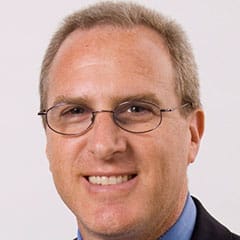Those were busy days at Drexel Burnham Lambert in 1987. A newly graduated Wharton valedictorian, Jonathan Coslet, W’87, joined the investment bank and specialized in leverage acquisitions. He left to attend Harvard Business School and spent two more years in banking—only to realize he wanted to be a principal. In a moment of both fortuity and boldness in 1992, Coslet read in The Wall Street Journal that David Bonderman and James Coulter were founding their own firm (with William Price III). He cold-called them. He’s been with TPG in San Francisco since, as it’s grown into the global giant with $66 billion under management that it is today.
WHARTON MAGAZINE: You’ve been with TPG for 22 years. Why?
JONATHAN COSLET: I find that it gets more and more interesting over time. The more senior you get, the more you develop deeper relationships with the management teams and have critical impact on strategic initiatives. I am a generalist in that I get to learn about everything from health care to retail to energy to software. I get to do that in India, in the United States, in China, in Vietnam. I get to do that sometimes in very deep ways.
But for me, I actually get to do something more than that [as CIO]. I oversee our entire portfolio of companies [roughly 100 of them].
WM: What do you see in the current economic climate?
COSLET: We’re five years post-downturn. The economy has improved a lot and feels like it’s continuing to improve, but we’re maybe in the sixth inning of that game.
WM: How does that translate into how you’re investing?
COSLET: We’re being relatively cautious at being too aggressive on the buy side, particularly for companies that are cyclical. We’re looking for more secular growth trends that can overcome a slump in the economy in two or three years. We’re selling at a rate of three to one versus what we’re buying.
WM: What are some of the bigger picture challenges for TPG?
COSLET: The biggest challenge is maintaining excellence while you grow. Many big firms, we were all very excellent when we were small and when we were medium sized, and now we’re getting much bigger. The bigger you get, the harder it is to really stand out and have top decile performance, which a lot of us had.
We’ve all growing our businesses into new geographies, new product types, new sectors, but the biggest challenge is the managerial challenge of growing and expanding and staying excellent.
But you know, it’s like any small company. The skills that you need to do that go beyond the original skills you had as four or five guys making really cool and interesting investments. How do you motivate people, find growth opportunities for young folks, how do you balance independence and autonomy for people versus central supervision?
WM: That said, what would you recommend to young people today? Go to a large firm or something more entrepreneurial?
COSLET: I knew I wanted to be on the ground floor of something. On the other hand, another potential path is spending a few years at an established leader where you get to see all the good stuff, be a part of all the good stuff, then decide if there are leader opportunities there or go into something more entrepreneurial. The riskier choice with more upside and more downside is to be an entrepreneur.
I always had the attitude if I tried that out at a young age, it didn’t matter. I could always go to an established firm. You have a window—age 22 to maybe 32—where you can try, you can experiment. At some point the window closes, and you have to be on a track.
WM: How should students compare PE versus other financial jobs?
COSLET: The private equity job is very people relationship, direct-impact oriented. Don’t think of it as a finance job. Think of it as a business job. When you get to my level, in some ways, we’re just a massive conglomerate.
WM: Do you have favorite career memories?
COSLET: The most memorable are always the turnaround, the companies that when you get there they are flat on their back and going the wrong way. And you come out the other end, and you’ve turned around the company dramatically. [Favorites for him include J.Crew, Oxford Health Plans and Burger King.]
Read the other “Pride of Private Equity” alumni profiles, as well as watch the video interviews with student leaders, here.

























